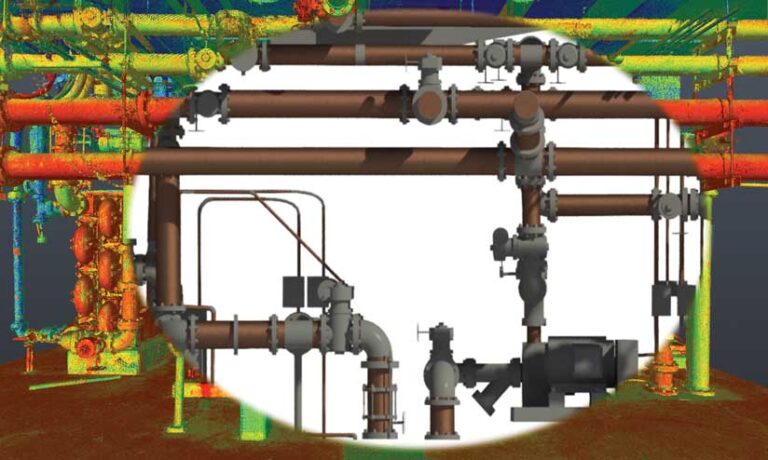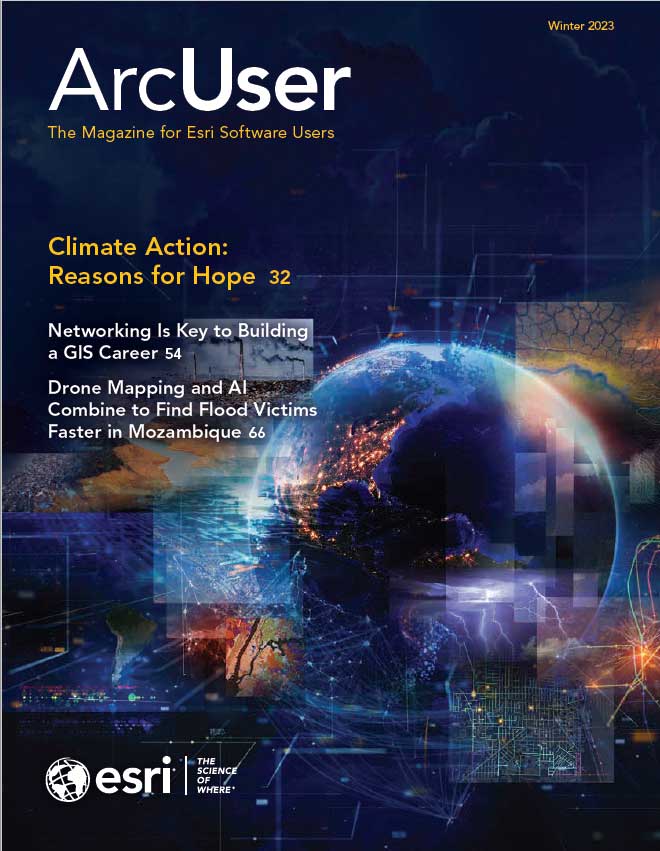Zach Jaffe is the GIS coordinator and project manager at LandTech Consultants Inc., a civil engineering and land surveying firm and Esri partner. [Since the publication of this article Zach Jaffe founded a geospatial consulting firm, Map I.T., and serves as its CEO. Map I.T. is an Esri partner.] He began his career working in surveying and GIS for water utility operations in Texas. Joining LandTech in 2018, he transitioned to a more specialized role in surveying and GIS, focusing on 3D data acquisition (lidar laser scanning), building information modeling (BIM), and GIS integration. Jaffe was a keynote speaker and presenter at the 2020 Esri Infrastructure Management and GIS Conference. His presentation highlighted his work with digital twins for facility and asset management. He is currently pursuing his professional land surveyor (PLS) and GISP certifications.
In this interview, Jaffe describes how and why he became interested in GIS and what has helped him build a successful GIS career.

Q: What do you love about GIS?
A: Maps are awesome—plain and simple—and creating maps is even cooler. The majority of people don’t know or even think about how the maps they look at and interact with are created. Most people still don’t realize how just about any group, organization, or business can benefit from GIS and mapping. I love to learn about different industries and figure out how to best apply GIS to solve real-world problems.

Q: How did you get your start in GIS?
A: I got my GIS start studying geography in college. Taking a GIS course as a geography major is very standard, and so I took two GIS courses and liked it. GIS skills seemed very applicable in the real world. In college, I also did an internship that helped gauge what real-world projects are going on with using GIS. It helped me learn and realize what GIS really is in various professions.

Q: How are you using GIS in your current role?
A: I use GIS pretty much every day. We use an ArcGIS software-specific environment for our project [goods and services] in the infrastructure world. I focus on water, wastewater, and utilities as well as universities and campuses. I also use GIS to promote our various services as well as constantly using it for research and development to find new and cutting-edge technological solutions.
Q: What are some GIS projects you are currently working on?
A: As of late, a lot of the projects I have been working on have been focusing on creating digital twins (or 3D models) for various facilities, including water/wastewater treatment plants. The models are created from a lidar survey/point cloud and BIM and integrated with the Esri ArcGIS environment primarily for asset and facility management. These projects are fun to work on because they involve so many different technologies and software solutions that all meet in the Esri environment for the final deliverable.
Q: What advice do you have for students and young pros?
A: My best advice for other young pros is to network, go to industry events, and put yourself out there. I have learned more at conferences just by speaking to people than I did in the majority of my college courses. When you meet people, you learn their thought process and point of view and take that into consideration when forming your own. Not only does it make you more aware, but building those connections is a huge part of being successful in business. Having a contact to call or team up with on a project has allowed me to grow in my position.
Q: What’s the value in attending conferences?
A: For me, going to a conference was the biggest eye-opener because there is so much value in attending. At conferences, you hear from people in various industries and how they use GIS, and it helps me to think about how I can apply GIS in my own role.
When I started in my role, my company didn’t have a GIS division, so I helped to implement GIS. This is where going to conferences is really helpful, because it helps me to grow GIS in my own company and probably is the best thing you can do for yourself to grow personally and professionally.
I’m fortunate in that my organization finds a lot of value in me attending conferences. I am able to justify attending conferences by making connections to bring back leads, being a presenter, and setting up follow-up meetings with people I’ve met, because this can all become a source of revenue.
Q: How did you handle starting the GIS division of your company?
A: It had its challenges, but I was lucky in my position to rely on my colleagues as subject matter experts, which helped guide me in what I should be doing in GIS. On the flip side, I didn’t have someone I can troubleshoot with when it came to the GIS technology. So, when I ran into issues, I would post it to the Esri Community web page or directly contact people in my network. This is why I go to conferences. They help to build my network because I know—at some point—I will need to lean on other attendees for advice and have the opportunity to return the favor as well.
Q: What advice do you have for someone starting out in their GIS career?
A: Think about industry first, then GIS. For example, I knew I wanted to be in the water industry, and then I used GIS as a tool to get me into that industry. Go after the industry you like and want to work in and see how GIS is applied or how you can apply it. Reach out to other people in that industry through LinkedIn. Most people are responsive and want to help or answer your questions.





